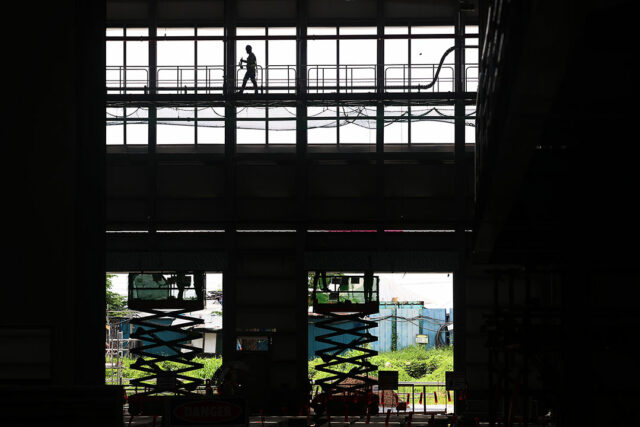By Beatriz Marie D. Cruz, Reporter
THE NATIONAL Government’s (NG) budget deficit widened in the first seven months of the year as spending growth outpaced revenues, the Department of Finance (DoF) said.
Finance Secretary Ralph G. Recto told the Senate Finance Committee that the budget gap ballooned by 7.2% to P642.8 billion as of end-July from P599.5 billion in the same period a year ago.
This accounts for less than half (43.32%) of the NG’s P1.48-trillion deficit ceiling for this year.
“We are on track to meet our fiscal program for the year with the robust performances of the Bureau of Internal Revenue (BIR), the Bureau of Customs (BoC), the Bureau of the Treasury, and our GOCCs (government-owned and -controlled corporations),” Mr. Recto told the hearing.
In the first seven months, government spending jumped by 13.2% to P3.25 trillion from P2.87 trillion a year ago. This accounted for 21.9% of gross domestic product (GDP).
Meanwhile, revenues climbed by 14.8% to P2.61 trillion during the January-to-July period from P2.27 trillion last year. This was equivalent to 17.1% of GDP.
Broken down, tax revenues rose by 11% to P2.24 trillion during the seven-month period from P2.02 trillion a year ago. This accounted for 14.6% of GDP.
“This strong revenue performance placed us among Asia’s top revenue-to-GDP ratios of 17.1% for the first half of the year, and this is above our full-year target of 16.1%,” Mr. Recto said.
Mr. Recto said BIR collections went up by 12.7% to P1.68 trillion as of end-July, while Customs collections rose by 5.8% to P535.9 billion.
Tax revenues from other offices increased by 14.9% to P20.4 billion in the first seven months from P17.8 billion last year.
On the other hand, nontax revenue collections jumped by 44.5% to P368.8 billion as of end-July from P255.3 billion in the same period last year.
This was driven by higher GOCC dividends in the first seven months of the year, Mr. Recto said.
As of end-July, BTr collections jumped by 27.8% to P183.8 billion, while nontax revenue collections from other offices surged by 66% to P185 billion.
The Finance chief attributed the government’s strong revenue performance to intensified digitalization and enhanced collection strategies.
Jonathan L. Ravelas, senior adviser at professional service firm Reyes Tacandong & Co., said the wider deficit can be attributed to higher debt servicing costs and increased spending to address the impact of natural disasters.
“The likely reasons for the widening budget deficit in July include increased government spending, higher debt servicing costs, and the impact of natural disasters. These disasters led to unexpected expenses for disaster response and recovery,” he said in a Viber message.
In a Viber message, Union Bank of the Philippines, Inc., Chief Economist Ruben Carlo O. Asuncion said the government is continuing its major push for infrastructure in the third quarter as seen with the faster spending.
In the first half of the year, state spending on infrastructure increased by 20.6% to P611.8 billion from P507.2 billion a year ago, according to the Budget department. This exceeded the P545.3-billion program for the period by 12.2%.
The NG aims to spend 5-6% of GDP yearly for infrastructure through 2028.
To address the widening deficit, the government must increase revenue collections, reduce spending, and promote economic growth, Security Bank Corp. Chief Economist Robert Dan J. Roces said.
Meanwhile, the DoF expects a 10.3% average annual revenue growth in the medium term as it ramps up its digitalization strategies, Mr. Recto said.
These strategies include border security enhancement, revenue collection and revenue-base protection, adaptive regulations and compliance monitoring, vigilant enforcement operations and vigorous intelligence gathering activities, and effective engagement with stakeholders as well as interagency cooperation.
Revenues as a percentage of GDP are expected to increase to 16.15% in 2025, 16.21% in 2026, 16.59% in 2027, and 16.96% in 2028.
For this year, the government’s budget deficit ceiling is equivalent to 5.6% of GDP. The government wants to reduce the deficit-to-GDP ratio to 3.7% by 2028.
Budget deficit data for July will be released on Wednesday, the Treasury bureau said.












